Search form
- B1-B2 grammar

Future forms
Oliver and Alfie decide to enter a bike race.
Instructions
As you watch the video, look at the examples of future forms. They are in red in the subtitles. Then read the conversation below to learn more. Finally, do the grammar exercises to check you understand, and can use, future forms correctly.
Daisy: Oliver’ll be back soon. Did he know you were coming? Alfie: Yes, we spoke earlier. We’re going to do a bike race so we want to plan our training schedule. Daisy: That sounds serious. When is it? Alfie: In about a month. It’ll be hard, but we’re going to do loads of training – long-distance rides at weekends and shorter rides during the week. Daisy: Wow! But you won’t be training every day, will you? Alfie: That’s what we’re going to talk about now. Daisy: In here. Want some tea? Do you want some, Alfie? Alfie: Yeah, please. No sugar for me – I’m in training! Oliver: Right. I’m just going to get a pen so we can write our plan down. Daisy: Amy’s coming round. We’re going to watch a film – want to join us? Oliver: Yeah, maybe..
( Later ... ) Oliver: What are you going to watch? Daisy: We haven’t decided. Maybe the new Matt Damon one … or a romcom. Alfie: If you choose the Matt Damon, I’ll stay, but I won’t if it’s the romantic one. Oliver: What’s the Matt Damon one about? Daisy: The Second World War. Oliver: A war film! Oh no. Amy: Come on, it’ll be good. It’s had great reviews. Oliver: Ah, all right then. Daisy: Mum’ll be phoning soon. Should we wait until after her call? Amy: Good idea. Where is she? Oliver: Egypt. In Alexandria, but she’s going south tomorrow. To Luxor, I think. Amy: Isn’t she stopping in Cairo? Daisy: I think so, yeah. How’s the planning? Oliver: Ah, well. We’re not going to do the race! We won’t be ready. And Alfie wants to put sugar in his tea again! Daisy: That’ll be Mum. Oliver: I’ll get it. Alfie: And we’ll get the popcorn ready, right Amy? Amy: Let’s do it.
We have different ways of talking about the future. We often use going to (+ infinitive), the present continuous ( to be + -ing ) or will (+ infinitive). The structure we use depends on the function of what we want to say, whether we are talking about arrangements, plans, predictions, etc..
I thought will was the future tense in English.
It’s one of the ways of talking about the future, but there are a few others. Let’s look at will to start with. We use will / won’t ( = will not ) + the infinitive for predictions about the future.
Oliver’ ll be back soon. We won’t be ready. Do you think it’ ll rain this afternoon?
We also use will when we decide something at the moment of speaking.
(The doorbell rings) I’ ll get it.
So, you sometimes use the verb think before will ?
Yes, that’s very common. We also use: don’t think , expect , be + sure .
I’m sure you’ ll have a good time.
You said will is used for decisions made at the moment of speaking. What about decisions made before the moment of speaking?
Then we can use either the present continuous or going to (+ infinitive).
Amy’ s coming round. We’ re going to watch a film – want to join us? What are you doing this evening?
Is there a difference between them?
We use the present continuous more for arrangements with other people and be + going to + infinitive for intentions. Sometimes it’s important to choose the right structure, but often we could use either because many events are both arrangements and intentions.
Amy’ s coming round. (= arrangement between Amy and Daisy) Amy’ s going to come round. (= Amy’s intention) I’ m going to clean my room tonight. (= intention) I’m cleaning my room tonight. (not an arrangement)
So could I say 'I’m going to go to the cinema with Alex'?
Yes, that’s correct. But we usually avoid saying going to go , just because it doesn’t sound very elegant. We normally use the present continuous with go .
I’ m going to the cinema with Alex.
And 'I will go to the cinema with Alex'?
No. We don’t use will for arrangements or intentions if the decision was made before the moment of speaking.
Oh, yes, you told me that before. Anything else?
Yes, there’s another use of going to . We use it for predictions too, especially when you can see something happening or about to happen.
Look out! You’ re going to spill that coffee.
Can you use going to for other predictions?
Yes, sometimes both will and going to can be used.
I think the Green Party will win the election. I think the Green Party are going to win the election.
OK, and one last thing! Is it correct to say, ‘When’s the race?’ That’s present simple, isn’t it?
Yes. You can use present simple for timetabled events.
My plane leaves at 4pm tomorrow. The match starts at 8pm.
Phew! So sometimes you can use going to or the present continuous and sometimes you can use will or going to . And you can also use present simple for timetabled events. I’ll never understand the future!
Check your grammar: grouping
Check your grammar: multiple choice, check your grammar: error correction, worksheets and downloads.
What are your plans for this weekend?

Sign up to our newsletter for LearnEnglish Teens
We will process your data to send you our newsletter and updates based on your consent. You can unsubscribe at any time by clicking the "unsubscribe" link at the bottom of every email. Read our privacy policy for more information.
Have an account?
Suggestions for you See more

Preschool Alphabet Rhymes Vocab
Tricky words, prepositions and places, dairy products, chinese new year.

Will vs going to
7th - university.
14.5K plays
19 questions

Introducing new Paper mode
No student devices needed. Know more
- 1. Multiple Choice Edit 1 minute 1 pt Tomorrow we ________ our grandparents. They invited us last week. are going to visit will visit
- 2. Multiple Choice Edit 1 minute 1 pt Who do you think ________ the match? is going to win will win
- 3. Multiple Choice Edit 1.5 minutes 1 pt _____________ to come to the meeting on Friday? Are you going Will you
- 4. Multiple Choice Edit 1.5 minutes 1 pt When I get older, I ________ rich and famous. will be am going to be
- 5. Multiple Choice Edit 1.5 minutes 1 pt Here comes our bus. Hurry up! _______ miss it! We are going to We will
- 6. Multiple Choice Edit 1.5 minutes 1 pt In the future, people _______ to work won't go aren't going
- 7. Multiple Choice Edit 1.5 minutes 1 pt ________ live on other planets? What do you think? Will people Are people going to
- 8. Multiple Choice Edit 1.5 minutes 1 pt Look at how that man is driving! He _______ an accident! will have is going to have
- 9. Multiple Choice Edit 1.5 minutes 1 pt I hope I ________ travel around the world when I am older. am going to will
- 10. Multiple Choice Edit 1.5 minutes 1 pt Next summer I ______ with my relatives in New York. will stay am going to stay
- 11. Multiple Choice Edit 1.5 minutes 1 pt Helen ______ move to London next year. is going to will
- 12. Multiple Choice Edit 1.5 minutes 1 pt (the doorbell rings) "I ** open it!" am going to will
- 13. Multiple Choice Edit 1.5 minutes 1 pt She ** attend medical school next year will is going to
- 14. Multiple Choice Edit 1.5 minutes 1 pt Don't worry. I ** be careful will am going to
- 15. Multiple Choice Edit 1.5 minutes 1 pt I promise that I ** home in time will be am going to be
- 16. Multiple Choice Edit 1.5 minutes 1 pt A: There's no milk. B: I know. I .... get some from the shop. will am going to
- 17. Multiple Choice Edit 1.5 minutes 1 pt It is hot in here. - I ____ open the window. will going to am going to
- 18. Multiple Choice Edit 1.5 minutes 1 pt I´m sleepy. I think I _____ to bed early. will go going to go am going to go
- 19. Multiple Choice Edit 1.5 minutes 1 pt Be careful!! That chair ______ fall! will going to is will is going to are going to
Explore all questions with a free account

Continue with email
Continue with phone
Exercise on Simple Present - Present Progressive
Put the verbs into the correct tense (simple present or present progressive).
- Look! He (leave) the house.
- Quiet please! I (write) a test.
- She usually (walk) to school.
- But look! Today she (go) by bike.
- Every Sunday we (go) to see my grandparents.
- He often (go) to the cinema.
- We (play) Monopoly at the moment.
- The child seldom (cry) .
- I (not / do) anything at the moment.
- (watch / he) the news regularly?

7 Tips For Traveling to Visit Grandparents

This is the week that many schools, daycare centers and greeting card companies celebrate National Grandparents Day. Technically, Grandparents Day in the United States was on Sept. 9 — but it's definitely not too late to celebrate the grandmas and grandpas in your life.
In my experience, the best way to do that is to visit and spend time with them. If you live down the street from the grandparents in your family, that may be a simple enough process. If you have to travel to visit your child's grandparents, however, there are a few ways to make the visit even better for everyone in the family.
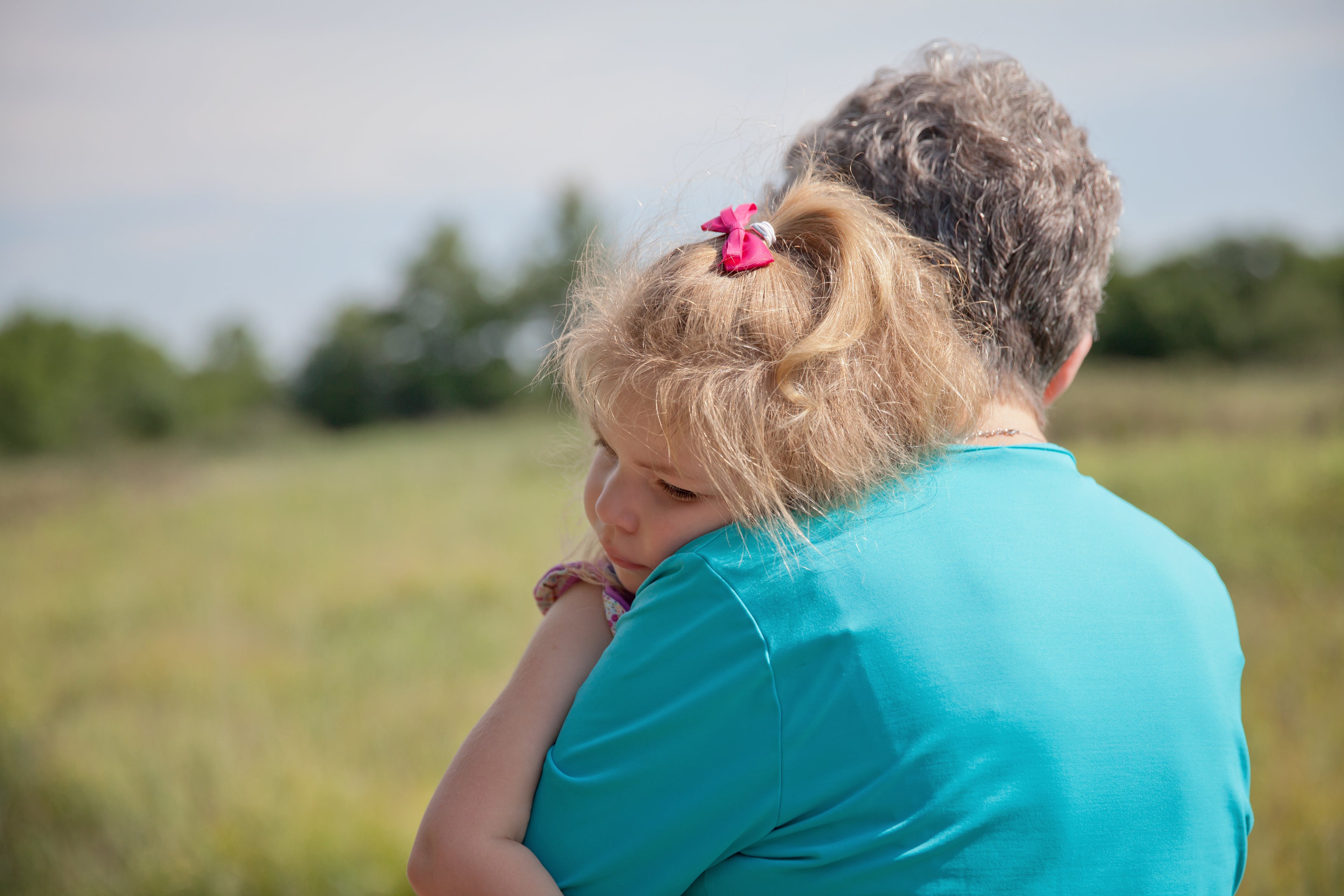
1. FaceTime between visits
Nothing replaces in-person time together with family. But FaceTime and similar services can certainly help close the gaps. Some regular 'FaceTiming' with grandparents is a great way to stay connected and ensure that your time together starts right where you left off.
2. Book your own hotel
If I could only share one tip for traveling to visit grandparents, it would be to book your own hotel room nearby rather than expecting Grandma and Grandpa to host everyone in their home. While there are exceptions to every rule, most people do better with their own space. Grandparents put all their energy into maximizing time with their grandkids during the day, so let them have their own space to recharge at night.
Along the same lines, visiting family can be as tiring as it is exciting, so having your own bed, shower and quiet space is worth the points (or cash) investment, so increase those point balances if you need to and make the reservation. This is especially true if the grandparents' house has limited space, or your visit is for longer than two nights.
And when grandparents travel to visit us, we like to book them a hotel nearby for all the same reasons.
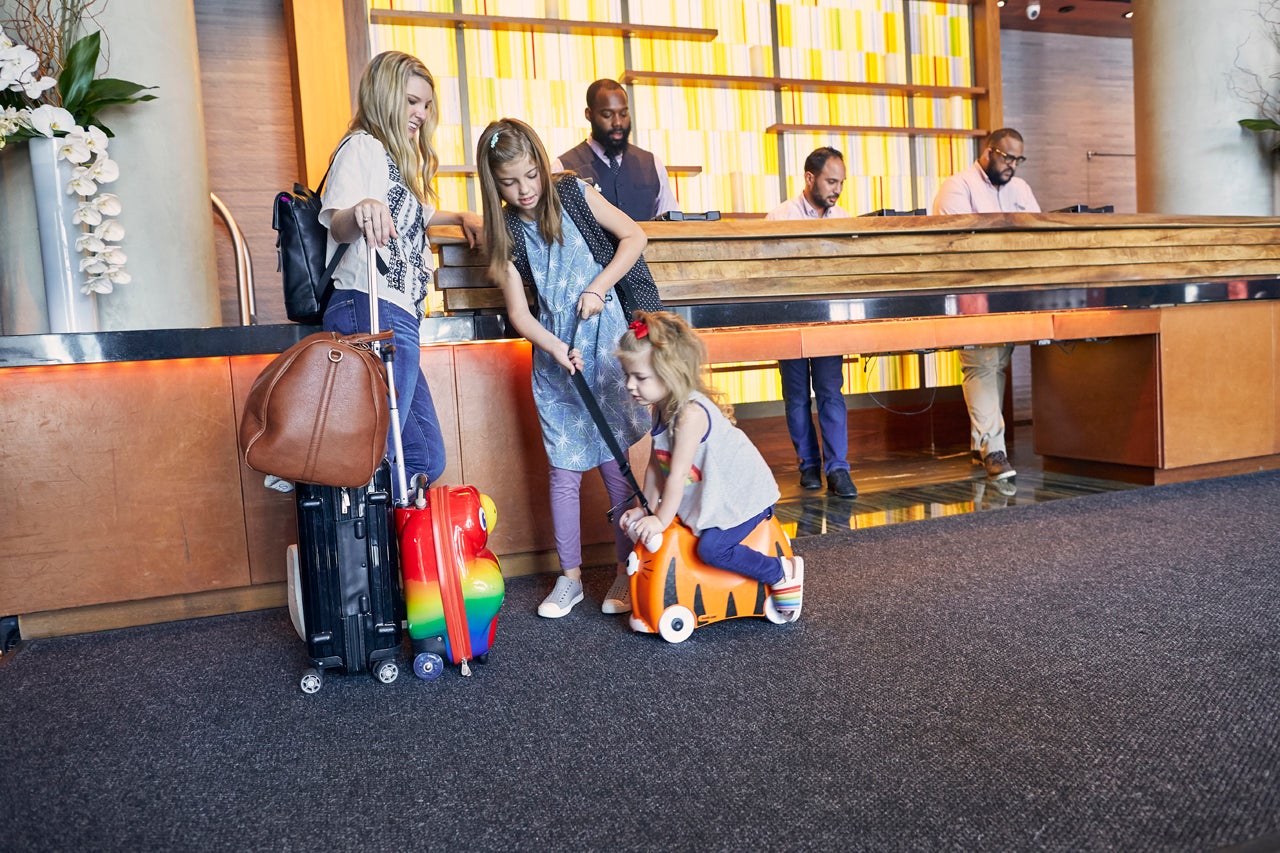
3. Let the grandparents plan activities
If Grandma and Grandpa have things they want your family to do while visiting, leave time to accommodate those specific activities. They may have waited a long time to have your family experience certain attractions and their favorite place to eat. They may even want the grandkids to meet their friends. If a suggested activity sounds like a really poor match for your family, voice your concerns. Otherwise, let them be your local tour guide as much as they want.
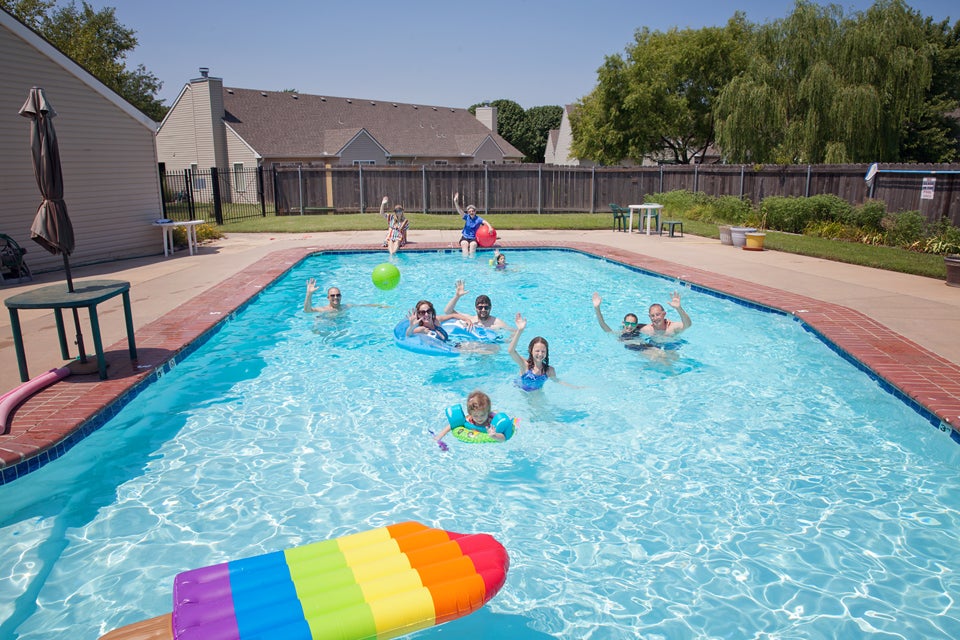
4. Get out of the way
If the grandparents want to take an active role with the grandkids for a few days: let them. Over the years, we've found that having two grandparents and two parents involved in all the daily tasks and activities is just too many cooks in the kitchen.
Personally, my husband and I like to have a couple days with everyone together, and then duck out for a short trip while the grandparents have the grandkids to themselves. (This works great if visiting the grandparents is a stopover on the way to somewhere else). If that isn't feasible, still try and stay out of the way as much as possible so Grandma and Grandpa can enjoy quality time the grandkids.
Of course, if your children are babies or very young and do best with a consistent routine — or if you have concerns about the grandparents' ability to safely keep up with your toddler — don't get out of the way completely.
5. Take professional pictures
Multi-generational time together is special, so take a few photos. Or a lot. Photos taken with your phone may be sufficient, but don't be afraid to invest in a professional photographer every once in a while (or at least a pro-quality camera) if you want to capture high-quality shots with everyone. It may be a pain to take photos in the moment, but you'll be very glad you have them down the road.
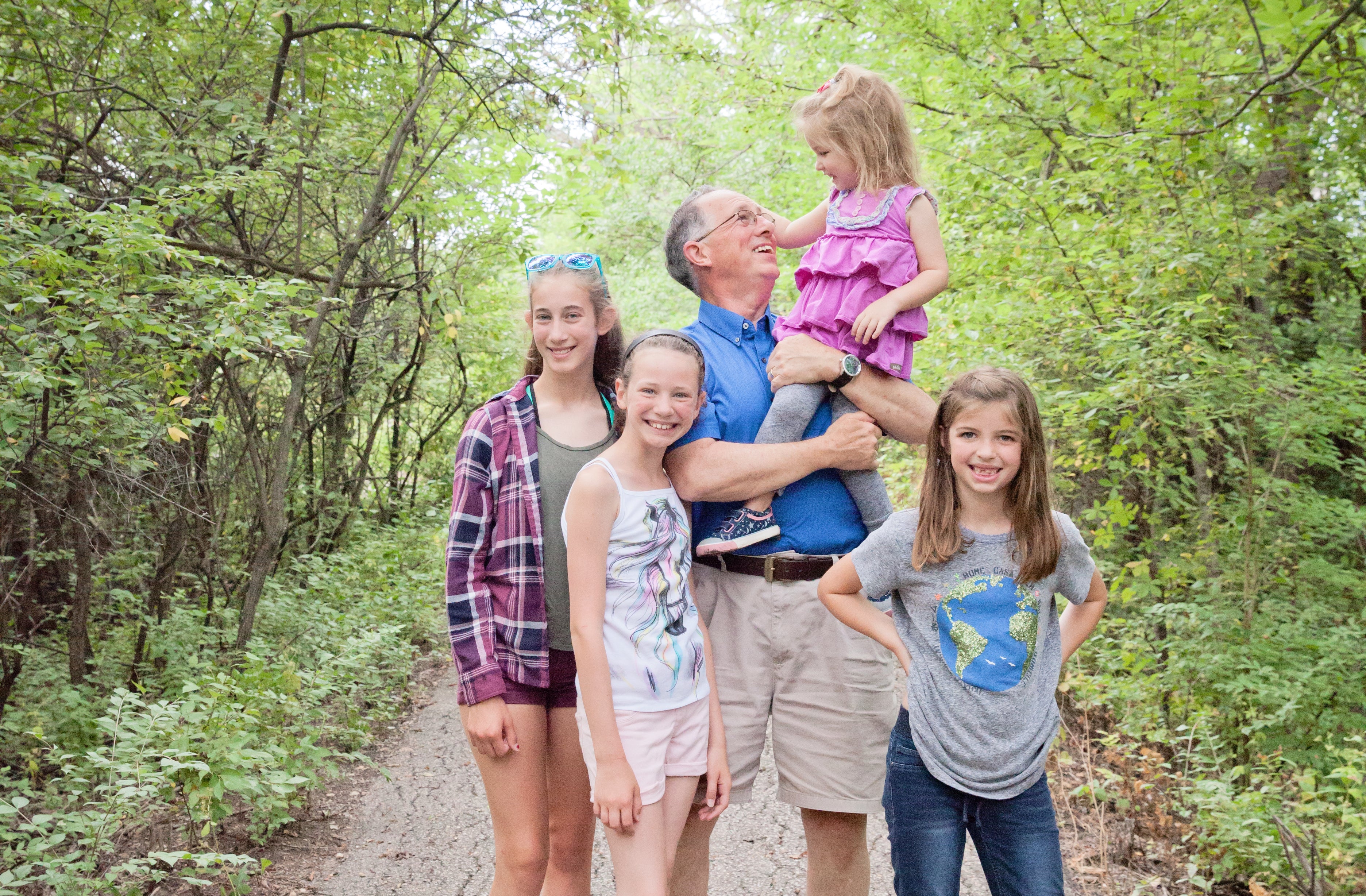
6. Don't overstay your welcome
The amount of time every family can — or wants to — spend together certainly varies. But in general, try not to overstay your welcome. Our family vastly prefers multiple, shorter visits with grandparents rather than one very long visit. By the third or fourth day, almost everyone starts to get run down. If you have a longer visit planned, that third or fourth day may be a good time for everyone to do their own thing and recharge.
Taking two independently functioning family units and combining them into one big mass isn't always simple, and it's OK to know your limits and keep visits short and sweet. Everyone is better off with a shorter period of time that goes well, rather than a longer period of time marked by family-fatigue.
7. Make plans to visit again
Saying goodbye is usually easier if there are at least rough plans for the next visit. You don't have to have actual reservations in place, but start the discussion about when and where the next visit should take place.
My family likes to alternate where we visit grandparents so that one family isn't always doing the traveling (or hosting). In fact, one of our favorite ways to visit with grandparents is to meet up somewhere fun, so that no one is hosting and everyone has exciting things to do and explore together. Regardless of where you meet, start that conversation now, so that goodbye isn't goodbye: it's see you next time.
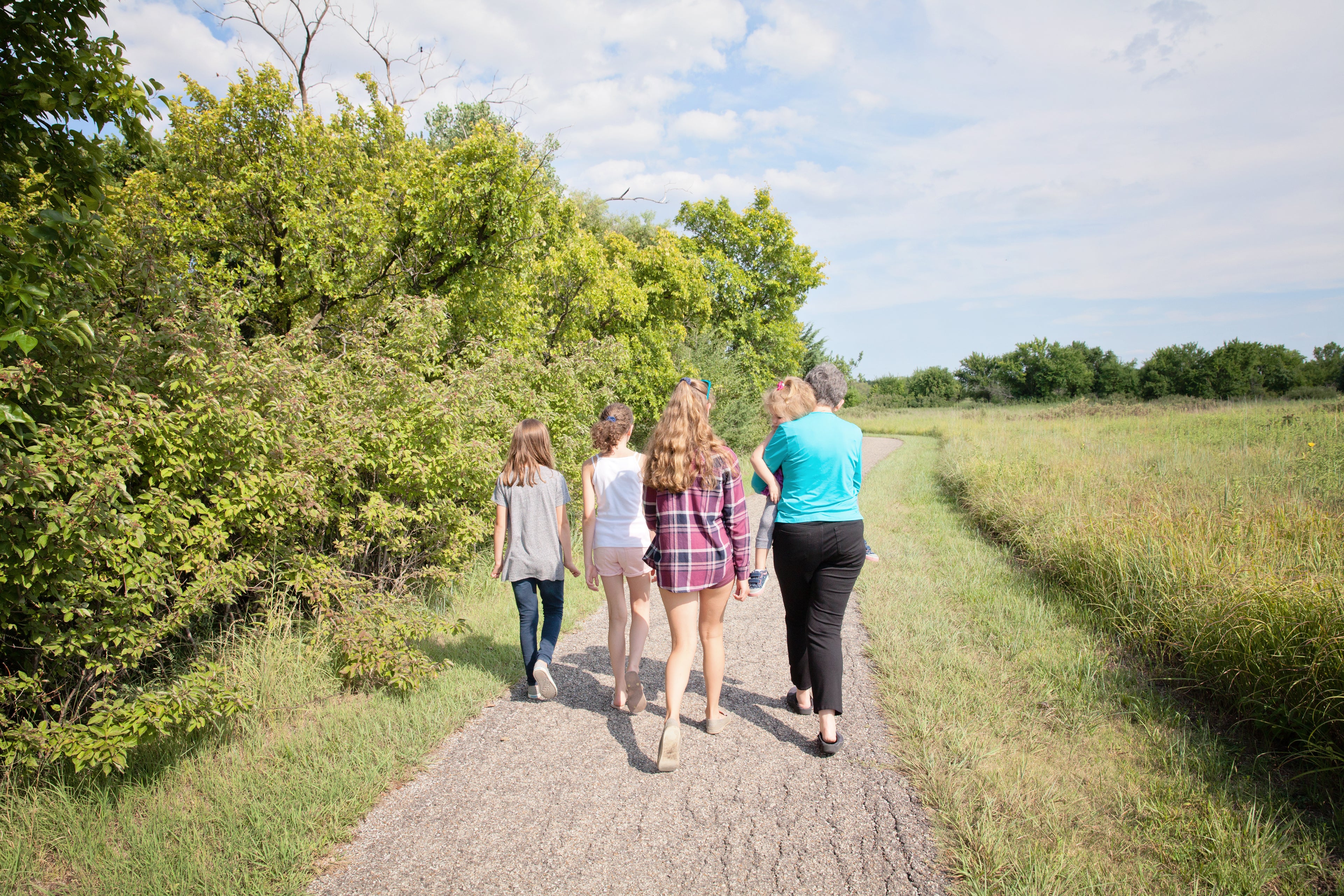
Images by Andrea Bacle Photography.

We are going to visit our grandparents when we ……………. our final exams.
B. finished
C. had finished
D. have finished
Select your answer:
Next Quiz >
Other quiz:
Complete the sentences with the gerund or infinitive form of the verb in parentheses.
Before _______________ to the second part of my presentation, I’d be happy to answer any questions. (move)
Lisa: Can you Sam? I don’t have time for him. I have to(必須)go now. Lily: OK. I am not busy.
A. wait with
D. wait for
Trending Topics
How to use : Read the question carefully, then select one of the answers button.
GrammarQuiz.Net - Improve your knowledge of English grammar, the best way to kill your free time.
2. Be going to
Leaderboard, visual style, switch template.

IMAGES
VIDEO
COMMENTS
Tomorrow we ________ our grandparents. They invited us last week. A. are going to visit B. will visit - Be going to / Will Quiz
D. has. Read the question carefully, then select one of the answers button. We are going to _______ (visit) our grandparents tomorrow. A. visited B. visit C. visiting - Grammar Quiz.
We have different ways of talking about the future. We often use going to (+ infinitive), the present continuous (to be + -ing) or will (+ infinitive). The structure we use depends on the function of what we want to say, whether we are talking about arrangements, plans, predictions, etc.. I thought will was the future tense in English.
Bill ------ (to visit) his parents tomorrow. He has got an appointment with them. A. is visiting B. will have visited C. will visit D. visits
Will vs going to quiz for 7th grade students. Find other quizzes for English and more on Quizizz for free!
He (leave / is leaving) the house! She usually walks to school. She usually (walks / is walking) to school. But today she is going by bike. But today she (goes / is going) by bike. Every Sunday we go to visit my grandparents. Every Sunday we (go / are going) to visit my grandparents. He often goes to the cinema.
As such the future progressive parallels the use of the present progressive to express arranged future events: I'm playing tennis with Mike tomorrow. I'm visiting my grandparents at the weekend. She's visiting Chichen Itza next week.
Next week is very busy for me! On Monday, we're going to the science museum with school. On Tuesday, our grandparents are visiting us. On Wednesday, I'm playing tennis. On Thursday, my sister is taking me shopping. On Friday, I'm staying at home!
1. Choose the correct sentence! d m visiting my friend tomo ro I tomorrow visit my friend. We go to the cinema on Sunday. ng to the cinema on Sunday. We going to the cinema on Sunday. What do you do this weekend?
Future continuous - Grammar chart Future continuous - Use We use the future continuous to talk about situations or actions that will be in progress at a certain time in the future. We use the future continuous instead of the present continuous to talk about future events that have already been planned or decided. Future continuous: signal words As you can see in the examples above, we ...
Future forms - will, be going to, present continuous Exercise 2 Choose the most suitable future forms to complete the sentences below.
Next week it's the holidays! We've got lots of plans. We're going to stay with our grandparents and they're going to take us to the seaside. I'm going to visit the funfair and my sister's going to go swimming. We're not going to do any homework! a. It's the holidays next week.
Put the verbs into the correct tense (simple present or present progressive). Look! He (leave) the house. Quiet please! I (write) a test. She usually (walk) to school. But look! Today she (go) by bike. Every Sunday we (go) to see my grandparents.
1. Multiple Choice 30 seconds 1 pt Tomorrow we ________ our grandparents. They invited us last week. are going to visit will visit 2. Multiple Choice 30 seconds 1 pt Who do you think ________ the match? is going to win will win 3. Multiple Choice 30 seconds 1 pt _____________ to come to the meeting on Friday? Are you going Will you Answer choices Tags Answer choices Tags Explore all questions ...
Tenses › View I leave home / run for the bus / and arrive to school / on time A. I left home, ran for the bus and arrived to school on time. B. I had left home, ran for the bus and had arrived to school on time.
In my experience, the best way to do that is to visit and spend time with them. If you live down the street from the grandparents in your family, that may be a simple enough process. If you have to travel to visit your child's grandparents, however, there are a few ways to make the visit even better for everyone in the family.
I didn't wanted to get up this morning! My dad drinked all the milk yesterday! Yesterday my parents didn't went out. We visited our grandparents last month. Last weekend I didn't do any sport. I didn't want to get up this morning! My dad drank all the milk yesterday!
The sentence describes the speaker's plan to visit their grandparents in the future. The sentence is structured in the passive voice, which is grammatically right in this case. The active form of the sentence would be "We will visit our grandparents this weekend." The verb tenses in context to the stated event are correctly used.
We turn back to face the crowd as the anthem of Panem plays. (Collins 33) A. Declarative B. Exclamatory C. Imperative D. Interrogative How to use : Read the question carefully, then select one of the answers button.
Intentions: I am going to start studying for the exam tomorrow., We are going to visit our grandparents next weekend., Predictions (often with evidence we can see):